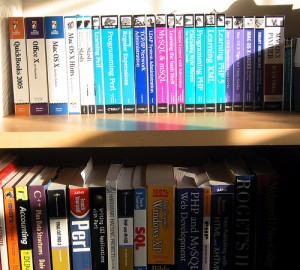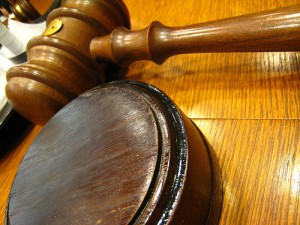In a decision that seems to be tailor-made to highlight the problems with the patent system, a Texas judge has ordered Microsoft to stop selling Word because it infringes a patent held by a small company called i4i. An IM discussion on the subject with Julian Sanchez inspired this sharp post. Julian looked at the patent in question and found it forehead-slappingly obvious, and we got into an IM discussion about how patents like this get through the review process. Julian’s initial theory was that the patent office needed to hire more computer programmers, but I was skeptical:
Tim thinks that’s not really the problem—the problem is that if an applicant wants to appeal, the examiner, who may well be a programmer, has to defend his subjective judgment of what’s “obvious” with some kind of explicit argument. And the result (says Tim) is that in practice the “non-obviousness” requirement has been largely conflated with a review of the “prior art” or previous related inventions. The upshot is that unless someone else has done almost exactly the same thing before, you’ve got a good shot at getting the patent. Maybe this is motivated by a version of the no-five-dollar-bills-on-the-sidewalk fallacy in economics: If nobody has done it before, it can’t have been all that obvious. But, of course, in a rapidly evolving area of technology, someone’s always going to be the first to do something obvious.
I think the source of the problem in the patent system may be linked to a point Friedrich Hayek made long ago about our tendency to overrate the economic importance of theoretical knowledge and vastly underestimate the importance of tacit or practical knowledge. The non-obviousness requirement, tied to the standard of an observer skilled in the appropriate art, is supposed to make the patent system sensitive to this kind of knowledge. But if examiners have to defend their judgments of obviousness, they’re essentially being required to translate their tacit knowledge into explicit knowledge—to turn an inarticulate knack into a formal set of rules or steps. And Hayek’s point was that this is often going to be difficult, if not impossible…
If you ask me how I knew the way to go about writing the translation program in question, I’m not sure I could tell you—just as we sometimes find ourselves at a loss when we’re asked to give explicit directions for a route we know by heart. Things that are “obvious” are often the hardest to explain or articulate explicitly, precisely because we’re so accustomed to apprehending them by an unconscious (and possibly itself quite dizzyingly complicated) process. The very term “obvious” comes from the Latin obviam for “in the way”—that is, right in front of you, where you can’t help but see it. Except the visual processing system we “use” automatically is vastly more sophisticated than what we’re (thus far) capable of designing. If you had to describe explicitly the unconscious process by which you see what’s right in front of you, it wouldn’t seem “obvious” at all. The same, I expect, goes for the knack of knowing how to go about solving a particular problem in coding or engineering—with the result that the patent system systematically undervalues the tacit knowledge embedded in those skill sets until it’s embedded in a piece of “prior art.”
It strikes me that what’s obviousness is a lot like humor. Take this comic, for example:

I think it’s hilarious. Chances are if you’re a programmer you do to, and otherwise you probably don’t. And it wouldn’t do any good for me to write a paragraph explaining that it’s about the 16-bit binary representation of integers; explaining a joke famously never works. You either “get it” or you don’t. And to get it, you have to share a body of common knowledge and experiences with the person who told the joke.
Something similar is true of obviousness. Ideas are not intrinsically obvious or non-obvious. They’re obvious relative to some body of knowledge or experience. This is why patent law requires that an idea be obvious to a “person having ordinary skill in the art”—in this case, a typical computer programmer.
 The patent system is based on the premise that the body of knowledge necessary to evaluate the obviousness of an invention can easily be obtained by a judge, perhaps with the aid of expert witness testimony. But I think there’s reason to be skeptical of this assumption. To be sure, a programmer can explain to a non-programmer how any given software technique works. But understanding how a technology works is very different from understanding whether it’s obvious or not. If you want to understand why programmers consider a concept obvious or non-obvious, you need a command of the body of knowledge programmers have, which is another way of saying you need to become a programmer.
The patent system is based on the premise that the body of knowledge necessary to evaluate the obviousness of an invention can easily be obtained by a judge, perhaps with the aid of expert witness testimony. But I think there’s reason to be skeptical of this assumption. To be sure, a programmer can explain to a non-programmer how any given software technique works. But understanding how a technology works is very different from understanding whether it’s obvious or not. If you want to understand why programmers consider a concept obvious or non-obvious, you need a command of the body of knowledge programmers have, which is another way of saying you need to become a programmer.
I hadn’t realized this when I started this post, but this is actually a corollary of the Ronald Burt insight I quoted in my very first post: ideas that are commonplace in one community will seem highly creative in others. And that means we should expect generalist judges to be lousy at judging which ideas are obvious in fields they don’t know well. Which to a first approximation is all of them.




Julian looked at the patent in question and found it forehead-slappingly obvious
And if our buddy “The Sanch” had made that blog post in 1989 it would mean something. But guess what . . .
wait for it . . .
wait for it . . . .
He didn’t! Hahhaha. Hindsight is 20-20. Time to pay the inventor for showing Microsoft the future that is now our present. It’s only money, Bill.
Don’t forget to check out my patent blog:
http://fedcirpatentcaseblurbs.blogspot.com/
And the result (says Tim) is that in practice the “non-obviousness” requirement has been largely conflated with a review of the “prior art” or previous related inventions.
It is actually much worse than that. In practice, non-obviousness is largely conflated with a review of what has been published in prior patent filings and in journals- i.e., with what is in the databases that an examiner can search. So if it has been sold in an actual product it still likely won’t come to the examiner’s attention unless the feature was also described in a patent application or in an academic journal, which as we know was vanishingly rare until very recently.
So if it has been sold in an actual product it still likely won’t come to the examiner’s attention unless the feature was also described in a patent application or in an academic journal,
That is what third party requested, ex parte reexamination is for, Luis.
Don’t get me wrong. I do think the definition of prior art should be changed and expanded. I think that prior art should be anything that is out in public (that is, publications, publicly accessible web pages, non-secret commercial products and prototypes) BEFORE THE PATENT APPLICATION PUBLISHES. On a related note, applicants should have the option to publish upon filing or anytime after that.
This would be much, much, much simpler than the current def’n of prior art as codified in 35 USC 102. And my proposed definition makes a lot more sense. However, we are not going to get sensible reforms until more of the pundits and public make it past patent jurisprudence kindergarten.
Maybe this is motivated by a version of the no-five-dollar-bills-on-the-sidewalk fallacy in economics: If nobody has done it before, it can’t have been all that obvious. But, of course, in a rapidly evolving area of technology, someone’s always going to be the first to do something obvious.
This part of the post is actually pretty meaty and worth exploring in more detail. Some points:
1. By the same token, if a technology is not evolving rapidly and someone is the first to do something, then that is incredibly powerful evidence that it is not obvious. Surprisingly, this does not seem to be the law right now. See:
http://www.cafc.uscourts.gov/opinions/08-1528.pdf
2. It is true that somebody is always first, but is that first person going to spend $5000 getting a decent patent application drafted and another couple of thou getting it issued? Answer: generally no, at least not if the person who thinks of the new thing thinks that it is no big deal.
3. This five dollar bill paradigm is also why I think the definition of prior art should be changed and that everything that happens before an application PUBLISHES should be prior art against it — basically, if somebody gets an idea first, but one or more other people get the same idea QUICKLY AND INDEPENDENTLY after the initial idea-getter, then the idea was obvious. Of course, it is tough to judge, at the margins, whether somebody get is truly working independently of the first idea-getter unless they are in a “clean room.” However, it the law presumes that everything done before the application publishes is independent of the putative inventor, and that everything after is not independent, then that seems like a fair approximation and a useful one.
4. Now, if the law would be changed to what I want it to say, then there would be a mad rush to get applications written, filed and published. But:
(a) that is incredibly good from the perspective of maximizing the timely and wide (but especially timely) distribution of new information; and
(b) it still takes time to draft up an application and get it on file — if the technology is really evolving that quickly, then someone else, probably someone not all caught up in drafting patent applications, will publish / release the idea in the interim — or, to put it another way, defensive publications would become hugely effective because one could be second or third to a new idea and still shoot down the earlier parties by publishing (eg, on their blog) before the others have gotten their filings in — you can’t do that under the current system.